FOI Fest talk
Here is my 10-minute talk from the FOI Fest conference – It’s a quick tour of some FOI lessons I have learnt – about persistence, phraseology, timing and the FOI requester’s Venn diagram, with a positive note at the end!
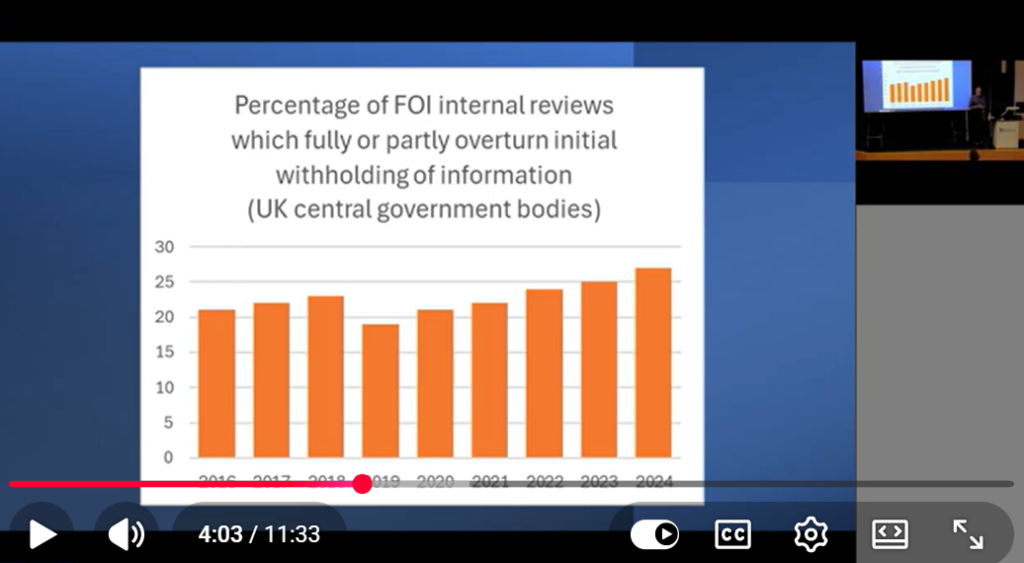
Here is my 10-minute talk from the FOI Fest conference – It’s a quick tour of some FOI lessons I have learnt – about persistence, phraseology, timing and the FOI requester’s Venn diagram, with a positive note at the end!

New disclosures from the National Archives reveal how ministers and officials struggled with the freedom of information system when it came into force in 2005.
“This is becoming a real problem” – that’s what a top Downing Street adviser told prime minister Tony Blair about FOI, just a few weeks after the law to open up the state to more scrutiny had come into force at the start of 2005.
Government files just released by the National Archives shed new light on how ministers and officials in Blair’s administration coped with the new public right to make requests for government documents, with their reactions varying from compliance through unease to outright hostility.
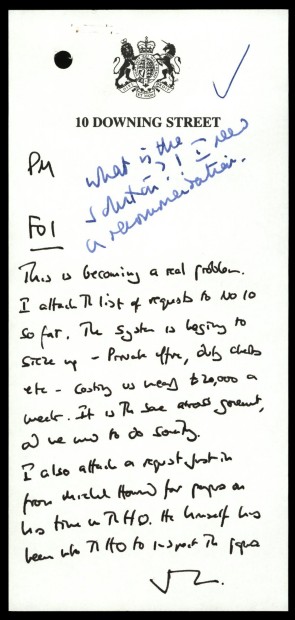
This particular memo was written in February 2005 by Jonathan Powell, who was then Blair’s chief of staff and today is still at the heart of power, as the current government’s national security adviser.
He told Blair: “The system is beginning to seize up – Private office, duty clerks etc – costing us nearly £20,000 a week. It is the same across government, and we need to do something.”
The prime minister replied: “What is the solution?! I need a recommendation”.
The government clearly found some of the initial rush of requests to be uncomfortable. In the following year they proposed new regulations to make it easier to reject FOI applications, but these plans met a lot of opposition and were abandoned.
Several years later, after he left office, Blair complained in his memoirs that civil servants had failed to warn him of ‘the full enormity of the blunder’ that in his view FOI proved to be. Powell also was later publicly critical of FOI, writing that ‘policymaking, like producing sausages, is not something that should be carried out in public’.
These files, which have been published under the 20 years rule for releasing old government records, also show how civil servants dealt with some of their first FOI cases.
They reveal how officials who did not want to release certain material relating to the Iraq war discussed which minister to approach for sign-off. They decided to ask the Foreign Secretary Jack Straw as they expected he would agree with their planned refusal, as opposed to the Cabinet Office minister David Miliband who they thought would not go along with this. An official added that if Straw wouldn’t comply, ‘we’ll have to work on Miliband’. Straw did.
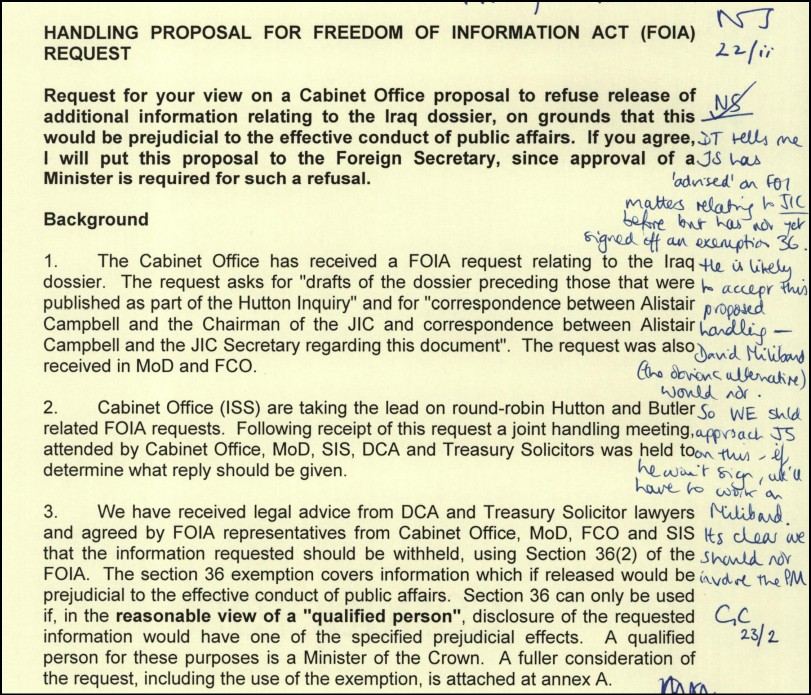
Other examples provide evidence of reluctant information releases which were enforced by the FOI law, as in this memo which an official sent to Blair.
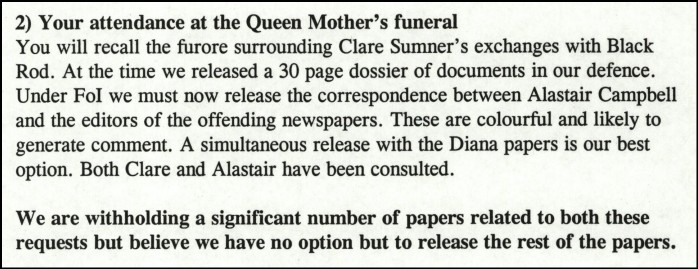
I was particularly interested to find discussion of how to respond to one of my early FOI requests – for correspondence between Blair and the Swedish prime minister, Goran Persson. I’d already obtained some of this from the Swedish government, which had a greater culture of openness, and wanted to see what Downing Street would supply in comparison.
Blair’s private secretary for foreign affairs, Antony Phillipson, recommended giving me the material, which he said contained nothing contentious. But he seems to have been overruled by the chief of staff, Jonathan Powell, who was worried it would set a precedent. Powell wrote that he was opposed to releasing any correspondence with foreign leaders.
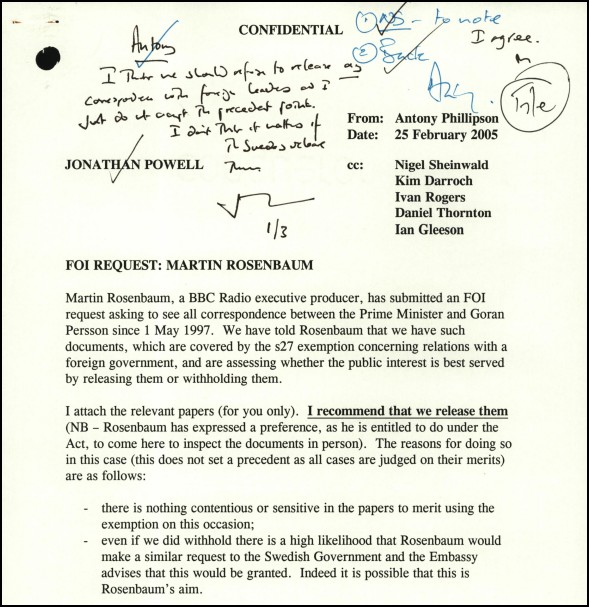
So this information has now finally been released by the UK government over 20 years after the Swedish government disclosed it.
It includes the letter Blair sent to Persson to say ‘thank you for Sven’. This was in the wake of the England football team beating Germany 5-1 in the World Cup qualifiers in 2001, an early triumph for the side’s new Swedish manager, Sven-Goran Eriksson.
I was once told by the then Information Commissioner Richard Thomas that Downing Street staff had informed him that they couldn’t send me this amusing but harmless brief handwritten note, which I had written about for the BBC after I obtained it in Sweden, as they hadn’t kept a copy of it. Yet funnily enough, here it is in their files.
The released documents also show that many ministers were particularly exercised about FOI requests for their diary information, such as who they had held meetings with.
Policy on this was discussed extensively in correspondence between departments. The topic also featured prominently in cabinet meetings during the early months of FOI, as is disclosed in the 2005 cabinet minutes which have also just been released.

The cabinet minutes also give a broader view of how the new FOI system was regarded within ministerial circles, often with concern rather than pride.
It is interesting to note that the cabinet minister responsible for FOI, the Constitutional Affairs Secretary Lord Falconer, was keen to get departments to publish FOI disclosures on their websites at the same time as giving the information to the requester. This was particularly in the case of the media.
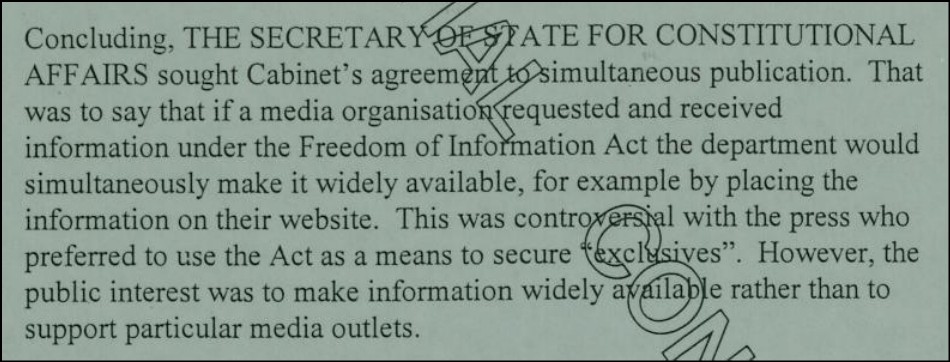
Falconer did not appear to be happy generally with the media’s use of FOI, as he told the cabinet on another occasion.
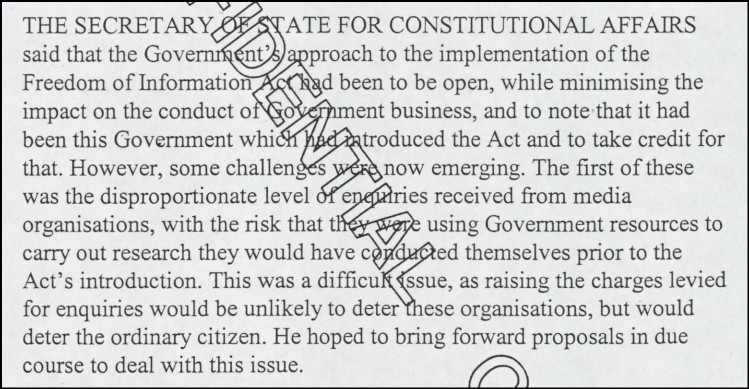
And finally, just before FOI came into force, this is how Tony Blair summarised matters to the cabinet, several years before he announced he was a ‘nincompoop’ for introducing the law.
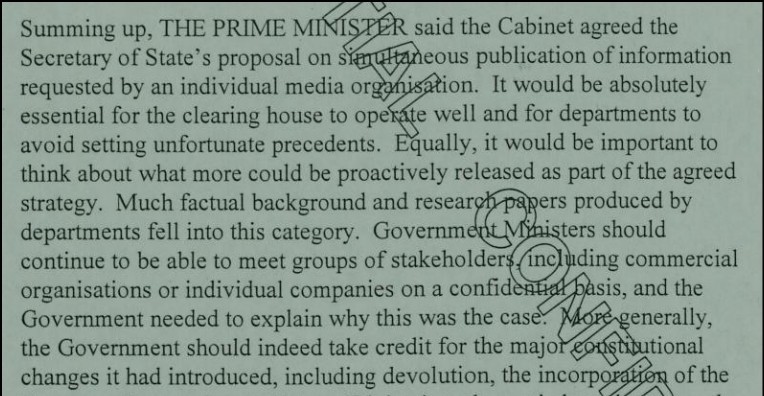
And one more thing. I wonder what Keir Starmer was saying back in 2005, in a legal opinion commissioned by the Guardian, on whether certain government legal advice should be disclosed.
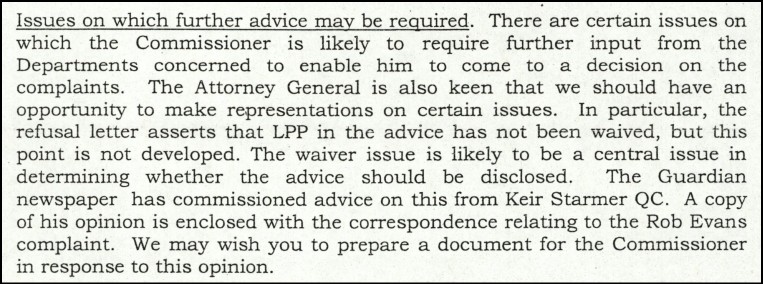
Tony, we have a problem Read More »
The Covid Inquiry has revealed how the use of chat apps in government created an unprecedented document trail, along with a temptation to avoid record keeping or to lose/delete records. Ben Worthy (of Birkbeck College) and I have co-authored a piece about this for Political Quarterly – https://politicalquarterly.org.uk/blog/government-by-whatsapp-covid-transparency-and-government-by-text/ .
Covid, chat apps and FOI Read More »
What does a recent Scottish local government by-election tell us about the prospects for anti-Reform tactical voting?
Could anti-Reform ‘tactical voting’ block Nigel Farage from becoming prime minister?
Analysis of last month’s Caerphilly by-election for the Welsh Senedd suggests it was a significant factor in Plaid Cymru’s dramatic victory, with supporters of other left-wing parties voting for the Plaid candidate to ensure that Reform was defeated, as polls indicated only these two parties had a chance of winning.
And this month a YouGov poll covered in the Times reported that around half of LibDem and Green supporters would be willing to back Labour to stop Reform taking their constituency.
But to make a much bigger impact, left-wing voters would also have to be ready to vote for the Tories to keep Reform out – and the YouGov poll suggested that a significant minority would indeed do this: the net figures given were 30% of LibDems, 28% of Labour supporters, and 18% of Greens.
Discussion of tactical voting can be misleading. Most voters don’t really have a carefully ordered, fixed hierarchy of party preference in the way that some political punditry assumes. But the key point is that substantial numbers would appear more determined to block a party they really dislike rather than elect a party on which they are particularly keen.
According to the leading psephologist Peter Kellner, tactical voting along these lines in a general election could deny Reform 100 seats in England. Of these, 52 seats would instead go to the Tories, 44 to Labour, and 4 to the LibDems. A scenario like this would dramatically reduce Reform’s chance of winning an overall majority.
Given this background, it’s interesting to examine a by-election last week in a Scottish local government area, Stranraer and the Rhins. The ward is part of Dumfries and Galloway Council, and incidentally happens to contain Scotland’s most southerly point, the Mull of Galloway.
The conditions in this by-election turned out to constitute a kind of natural experiment about the extent of anti-Reform voting.
This is a location of traditional Conservative strength, and the by-election was narrowly won by the Tory candidate, just beating the new challenge from Reform.
It’s revealing because Scottish council elections are held under the single transferable vote (STV) system, where voters list candidates in order of preference.
At each stage of counting the votes, the candidate with the smallest number of preferences is eliminated, and the next preferences indicated by their voters are then allocated accordingly among the remaining candidates, before the next elimination.
This means we can gather information about the second or lower preferences of voters – and actual voters taking part in a real election, rather than respondents to a poll who are making predictions about how they might vote in hypothetical circumstances.
Whatever its merits as an electoral system, STV is certainly a boon for political analysts.

In this by-election the Reform candidate John Roberts was ahead at every stage of the count until the concluding one, when he was finally overtaken by the Conservative candidate, Julie Currie, who won by 42 votes, with 1565 to Reform’s 1523.
At the first stage Roberts had been leading with 1386 first preferences compared to Currie’s 1302. Then during the count Currie gradually caught up a bit at nearly every stage due to allocations of preferences as other candidates were eliminated, eventually nudging ahead to win thanks to the lower preferences passed on from the third-placed SNP candidate.
As the LibDem, Green, independent, Labour and SNP candidates were all knocked out, and lower preferences were transferred, the cumulative effect was that Currie obtained an additional 263 votes for the Tories, while Roberts only put on 137 more for Reform.
In other words 66% of these lower preferences transferred to the Conservatives and only 34% to Reform. This pattern was broadly consistent for each party eliminated during the count. And it was enough to ensure – narrowly and only at the last moment – that Reform lost and the Tories won.
This might seem to confirm the potential for such anti-Reform tactical voting for Conservative candidates by some on the left. But there are also some powerful pointers in the other direction.
Firstly it’s notable that about one in three of these voters actually preferred the Reform candidate to the Conservative, so the pattern of preference is far from universal. Nor is this at all surprising, given that Reform has been picking up support from across the political spectrum.
But perhaps more importantly, there were 852 supporters of these other candidates who in the end did not express any preference between Conservative and Reform. Thus overall, in what was clearly a two-horse race between the Tories and Reform, just 21% of the other voters preferred the Tories, and 11% Reform, so that the eventual net benefit to the Tories consisted of 10% of these others.
And this in a contest where due to the electoral system voters could still happily put their top preference first, while preserving the political impact of their lower preferences, without any need for the reluctant compromises of tactical voting.
This pattern is therefore significantly weaker than the picture which emerged from the YouGov poll. It could suggest that 10% is a reasonable upper limit for the proportion of left party supporters who might vote Tory to block Reform in seats where they are the two parties in contention.
On the other hand, 10% (or any figure close to it) is certainly not nothing. In a general election any degree of tactical voting by leftists for Tories to that sort of extent would be enough to affect some Tory versus Reform battleground seats and possibly the overall national position.
There are lots of caveats about all of this, naturally. While this was an actual election, it only consists of one local ward with about 4,000 voters taking part, in Scotland, under a different voting system, and could be completely unrepresentative. Not least, there may of course be all sorts of specific factors to do with the individual candidates and the local campaign, of which I am unaware.
And, in terms of the incentives to vote tactically, it must be said that even for many voters who are very uneasy about Reform, the prospect of a Reform candidate being elected to Dumfries and Galloway Council is not quite the same as the prospect of a Farage government.
Will the left vote Tory? Read More »
Research data suggests that, in terms of their personalities, Reform voters are on average the least agreeable, while Green voters are the most neurotic.
As for their pastimes, Greens seem to enjoy going for country walks and Tories doing the gardening, while Reform voters do not like watching BBC news.
And in terms of shopping, Morrisons appears to be the large supermarket chain with the most politically representative clientele.
I have derived these little nuggets of political analysis from a new dataset published last month by the British Election Study (BES).
The BES is a long-running academic research project involving extensive surveys of voting patterns, political attitudes, and demographic and social characteristics.
In the past week or so I have read three substantial pieces of political analysis which rely on the latest BES samples, by Ben Ansell of Oxford University, James Breckwoldt of Manchester University, and Dylan Difford of YouGov.
They are revealing and thought-provoking articles about parties and social class, the traits and attitudes of Reform supporters, and how public opinion has shifted in the past year, and I recommend them all.
However it is also possible to find amongst the riches of the BES datasets some minor gems, which are perhaps less politically significant but are nevertheless intriguing in their own way. So I’ve been looking at the most recent BES sample (wave 30).
When I refer here to voters for a particular party, that is based on how survey participants (sample size of over 6,000) say they voted in the May 2025 local elections in England, which saw major advances for Reform.
Personality
If different humans have different personal dispositions towards, for example, behaviours like self-reliance, trust, flexibility, boldness, anxiety, diligence, and so on, then (whatever the difficulties in measuring these) it is not surprising if features of this kind have some influence on political attitudes, as one factor among many.
The latest BES survey contains scores for aspects of the personality of respondents, tied to the so-called ‘Big Five’ psychological traits: agreeableness, conscientiousness, extraversion, neuroticism and openness.1
These ratings are based on the participants’ answers to a battery of questions aimed at identifying those broad characteristics.
Not everyone agrees this is a valid model of human nature or that self-completion is a reliable method of assessment, but it is dominant in the field of personality psychology and widely used in commercial and academic research.
This table shows the average score for each party’s voters on a scale for each of these personality dimensions. The maximum score in each case was 20.
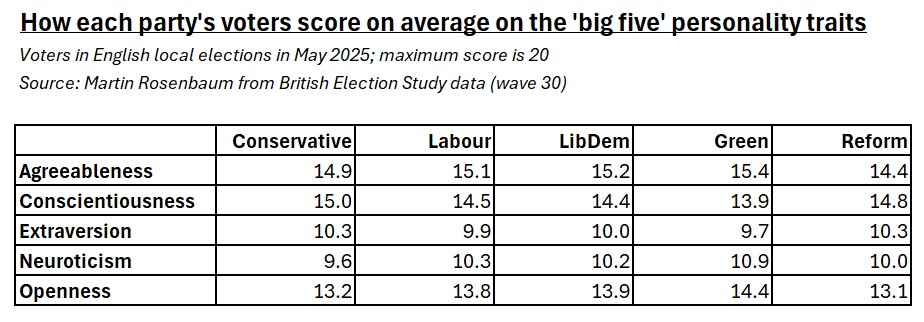
The variation shown here isn’t massive, and the sample sizes for the party breakdowns aren’t very large. But the overall pattern is consistent and fits well with previous research on the same subject: right-wing voters tend to be more conscientious and extravert, left-wing voters tend to be more agreeable, open and neurotic.
What’s different here is that in the past in Britain this was mainly a Conservative vs Labour contrast. The rise of other parties means that we can now see these tendencies particularly sharply in Reform and Green supporters, who are likely to be especially right-wing and left-wing respectively and appear to have the personality characteristics to go with it.
So Green voters seem to have the highest average ratings for agreeableness, openness and neuroticism, and the lowest ones for conscientiousness and extraversion.
Reform voters tend to score the lowest on agreeableness and openness. It’s the Conservatives who register the highest scores on conscientiousness and extraversion, and the lowest on neuroticism, while Reform voters are second in each case.
The average personality ratings for Labour and LibDem voters are very similar to each other and middling.
Bear in mind that all these numbers here are averages – there is a lot of scope for individual variation.
Activities
The BES has also asked survey respondents a collection of questions about what leisure activities they participate in.2
The results suggest that Green voters are the most active in all sorts of ways, which may reflect their younger age: as well as country walks, this includes attending gigs and going to the gym, and perhaps more surprisingly even eating at McDonalds.
Reform voters seem to be much less active generally, at least in the sort of pastimes that social scientists like to ask about. However Conservatives apparently enjoy visiting stately homes as well as gardening.
But in my opinion the most interesting and revealing comparison between the activities of different party supporters lies in who watches BBC news.
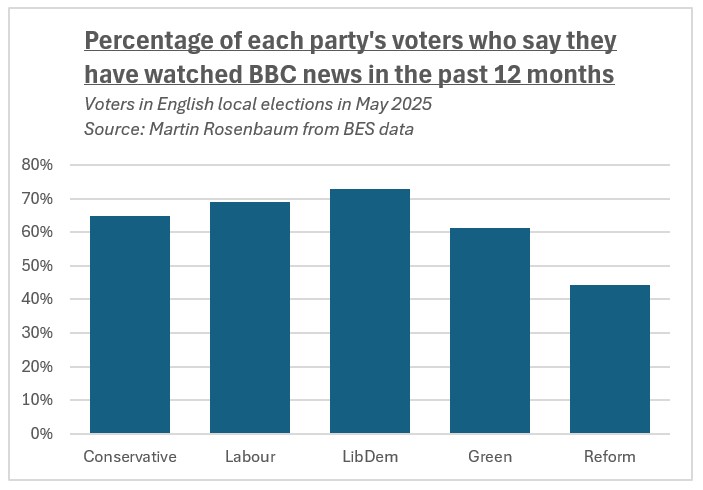
This shows how Reform voters are much less likely to be getting their news from the BBC.
Only 44% of Reform voters said they had watched BBC news in the past 12 months, compared to 61% of Greens, 65% of Tories, 69% of Labour voters and 73% of LibDems.
Supermarkets
There’s also a BES question about which supermarket respondents use for most of their food shopping,3 and there are some political differences in the answers.
So 30% of Reform voters say Tesco, compared to only 17% of Greens. However some shopping preferences are shared by these two groups: 21% of Greens and 19% of Reform voters do most of their shopping at Aldi, compared to only 11% of LibDems.
The most politically balanced large supermarket chain seems to be Morrisons. This is favoured for most of their food shopping by about 6-7% of each party’s voters.
I don’t know if the chance to chat with a good range of fellow customers counts as another reason to shop at Morrisons, but if so it’s another useful by-product of academic research.4
Notes
1 See p14 of the survey documentation; the sample size for this is 3,077. By the way, if you find any of this personality terminology to be annoyingly judgmental about human characteristics, don’t blame me, I didn’t invent it.
2 See pp 650-652 of the survey documentation; the sample size here is 1,476.
3 See p649 of the survey documentation; the sample size for this is 1,461. But note the party analysis for this question involves splitting the sample two ways (by party and preferred supermarket), so the cross-cut sub-samples will be much smaller.
4 I haven’t told you some of the other fun facts to be found in the data, such as that Green and Reform voters are the most avid readers of horoscopes, and Labour voters are the most frequent visitors to the opera and the least likely to do their shopping at the Co-op, while LibDems are the keenest on shopping at Waitrose, but sadly the numbers involved in these cases are so small that we can’t place any reliability on these findings, and thus, as Wittgenstein said, for those things of which we cannot speak, of them we must be silent.
Politics, personality and pastimes Read More »
The UK’s major complaints services are receiving increasing numbers of cases to investigate, and the use of generative AI chatbots might be a cause.
How much is generative AI already helping people to assert their legal rights?
Direct research evidence is limited, but one indicator could be that (according to data I’ve obtained) the UK’s main complaints services have seen a recent upsurge in the numbers contacting them.
This mirrors the latest official freedom of information statistics which show a significant increase in the level of FOI requests to central government, another civic right.
AI chatbots may be lowering the barriers for ordinary citizens to pursue their grievances over how they’ve been treated by a public authority or commercial company.
On the other hand AI systems are not always used sensibly, while the greater volumes are increasing the demands on those at the receiving end.
I made FOI requests to establish the monthly figures for new cases over the past three years from a dozen authorities which investigate complaints from members of the public, such as the Financial Ombudsman Service and the Local Government and Social Care Ombudsman.
The charts below show the three-year pattern in the level of complaints they each received per month. (For further explanation see the notes at the end.) There are lots of ups and downs in each case, but a broad overall trend seems clear.
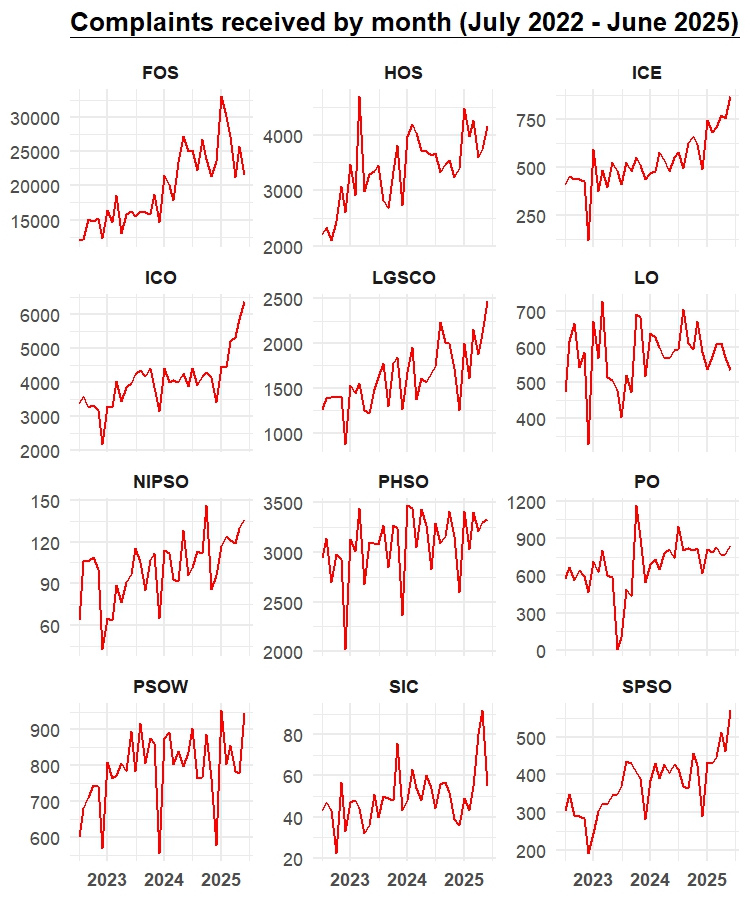
While none of these bodies seems to have conducted a formal analysis of the role of AI in the increases they are facing, anecdotally within the sector there is talk of the rapidly growing use of AI tools as being a major contributory factor.
The same is true within the FOI community, where some practitioners believe AI is boosting requests.
The next chart is taken from the latest government FOI statistics published last week, and shows what has happened to numbers of FOI requests to central government bodies over the past three years.
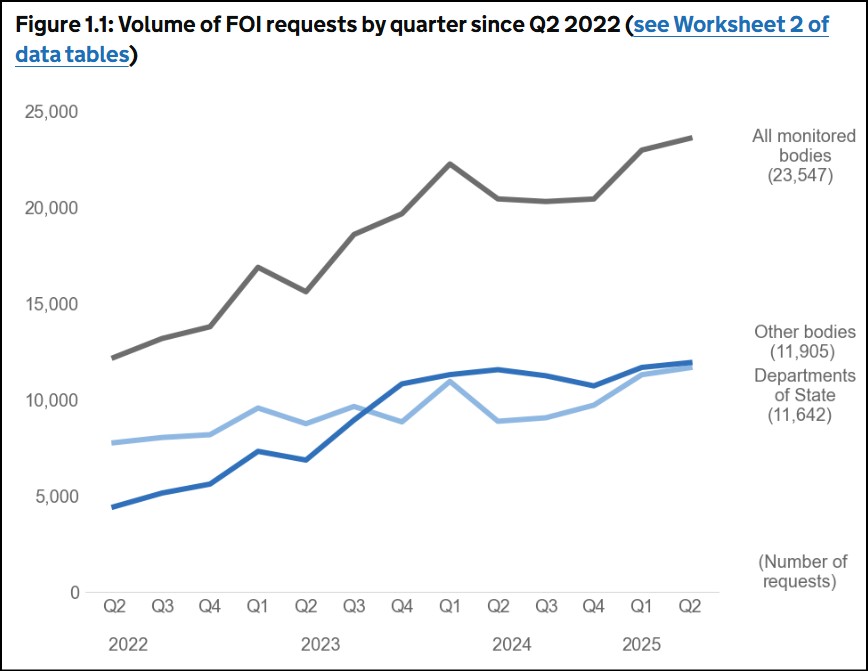
The evidence of AI playing a role in all this is circumstantial and anecdotal, but in my view it would be surprising if it wasn’t true. If you make something easier for people, and tell them how to do it, they will do it more often. A little experimentation confirms that popular chatbots will explain how best to raise complaints about failings in services and which organisation to direct them to, and conveniently offer to supply a draft or template for use.
While I’m not aware of any similar research in the UK, one American study last year reported that 18 percent of complaints to the US Consumer Financial Protection Bureau had evidence of text generated by an AI large language model.
Nevertheless there could also be other possible causes involved, such as perhaps a more general willingness to complain or more to complain about, as well as the specific factors that would significantly affect individual services.
It seems likely that younger and more tech-savvy citizens would be the earlier adopters. But the US experience suggests that possibly the use of AI in this way is also particularly helpful to people who are less proficient in English.
However the lazy or careless use of AI can hinder rather than help complainants. Last week the Information Commissioner’s Office rather sarcastically rebuked a requester for an internal review application which contained inaccurate statements. The ICO suggested the requester had relied on AI and added: “We advise that any AI generated material is verified before including it in your responses.” (This was spotted by the FOI trainer Tim Turner).
Collating these raw numbers leaves open the question of whether AI-assisted complaints are more or less likely to be effective.
But either way the increased number of complaints may present difficult challenges for these organisations, who will have to cope with the extra workload and prevent the build up of backlogs, possibly without the benefit of extra resources.
In due course AI tools may also help them process complaints more efficiently, in ways that some have already started to develop. However there are serious doubts about both accuracy and public acceptance for automated decision-making.
Notes
Financial Ombudsman Service (FOS) handles consumer complaints about financial services.
Housing Ombudsman Service (HOS) deals with residents’ complaints about social housing in England.
Independent Case Examiner (ICE) reviews certain complaints about state benefits and financial support.
Information Commissioner’s Office (ICO) covers data protection and freedom of information complaints. My chart amalgamates the figures for these two aspects of its work.
Local Government and Social Care Ombudsman (LGSCO) investigates complaints about councils and adult social care in England.
Legal Ombudsman (LO) handles complaints about legal services.
Northern Ireland Public Services Ombudsman (NIPSO) investigates complaints about public bodies in Northern Ireland.
Parliamentary and Health Service Ombudsman (PHSO) deals with complaints about UK government departments and the NHS in England.
Pensions Ombudsman (PO) covers pension schemes. The dramatic blip in the chart for mid-2023 is because for a period its online submission form was not available, followed by a rush of complaints when it returned.
Public Services Ombudsman for Wales (PSOW) handles complaints about Welsh public services.
Scottish Information Commissioner (SIC) covers Scottish freedom of information cases.
Scottish Public Services Ombudsman (SPSO) deals with complaints about Scottish public services. And on a side note, they responded to the FOI request which I submitted at 5pm one day by sending all the requested information at 1030am the next morning – so well done to them for the efficiency of their FOI operation.
My full dataset can be downloaded from here.
Generative complaints Read More »
Last month the government issued a new policy paper on its plans for reforming electoral law. Some of the proposals stemmed from a strategic review of electoral registration and conduct, which however was not released. But under FOI I have obtained a copy of it from MHCLG and have posted it here. It provides more details on the background and justification for some of the government’s intentions, and contains a substantial section on improving processes (such as postal ballots) for overseas voters, which seems to have been completely ignored.
Electoral conduct review Read More »
An edited version of a presentation I gave last month for staff at the Information Commissioner’s Office about my perspective on FOI and the ICO. Many thanks to the ICO for asking me to address them.
Thank you very much for inviting me. It’s a pleasure to have this opportunity to share my thoughts on freedom of information from the user’s perspective.
That perspective goes back about 20 years or so, because I’ve been making FOI requests since the law came into force in 2005, primarily as a journalist. Before that I made requests under the previous system, the Code of Practice on Access to Government Information, a much weaker system than the FOI law we have today.
During my time at the BBC, I specialised in using FOI, both submitting requests myself and advising and training other journalists on how to use the law effectively. I left the BBC around four years ago, and since then I’ve written a practical guidebook for FOI requesters.
So over the past two decades I’ve seen a lot of FOI in practice, and when people ask me for an overall verdict on FOI – is it working well, or not? – I have sometimes described it as a ‘tale of two giraffes’.
Of the two giraffes photographed in this slide, one is in London Zoo, and the other is in Whipsnade Zoo in Central Bedfordshire. Three years ago I was doing some research into zoos, and I asked for the latest inspection reports on these two zoos, which should be a very simple FOI request.
Central Bedfordshire Council sent me the latest inspection report on Whipsnade within an hour. It was absolutely the way FOI should work.
Westminster Council, the council responsible for London Zoo in Regent’s Park, didn’t reply. After 20 working days. I sent them a chasing email. They didn’t reply to that. I had to complain to the ICO, and the ICO – thank you very much – did the usual thing of sending an email saying you must reply within 10 working days, and eventually five months after my request I got the report from Westminster.
So what one public authority had been able to do within less than an hour, it took another public authority over five months and the intervention of the regulator.
In other words, sometimes FOI works very well in practice, sometimes it works very badly. And obviously there’s also a lot of circumstances in between those two extremes. But the key point is that the experience of FOI as a requester is that it’s very varied. There’s both a positive side and a negative side.
The positive
Taking the positive side first, and looking back over the last 20 years, one of the very good things is the way that FOI has become well established as a tool that a lot of people use successfully.
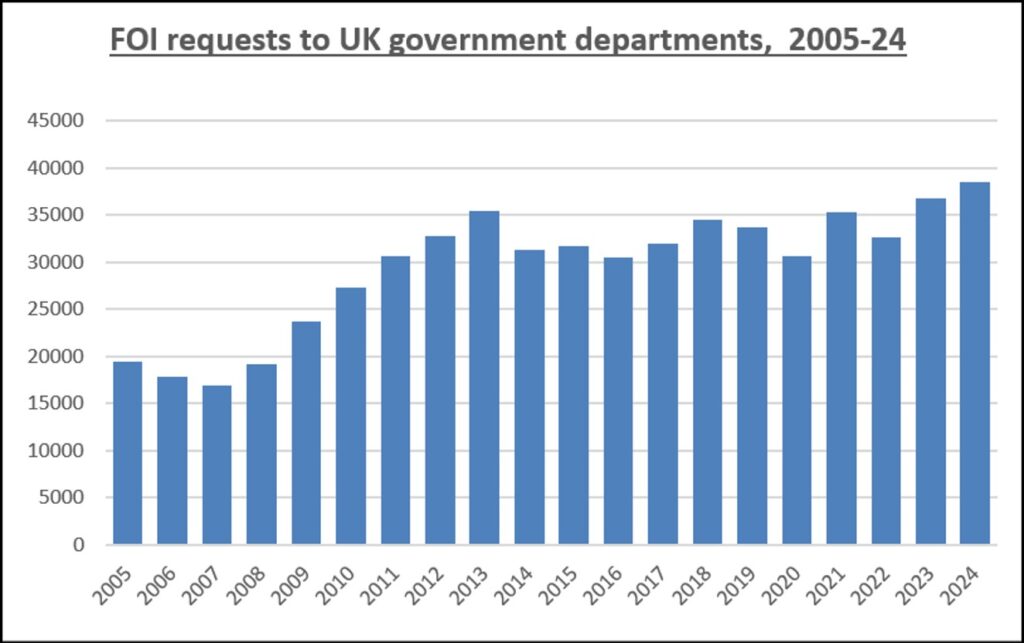
This is a chart which I’ve compiled from government statistics. I don’t think anybody else, by the way, is analysing these annual statistics in the same way that I do, keeping track of them over every year going back to 2005. This shows how in terms of central government departments, for the first few years the number of requests increased quite steadily until about 2013. Since then the numbers have been fairly steady over the past 10 to 12 years or so, maybe 35,000 FOI requests annually to government departments.
As you know we’ve only got statistics for central government bodies. So this is only a very small sample of FOI requests. Yet even so it’s one way of showing that FOI has become well established.
However, that fact obviously hasn’t gone down well with some people. For example, Tony Blair, who said that introducing FOI was like giving people a mallet to hit him over the head with, and that it was one of his two biggest mistakes. He famously wrote these words in his memoirs about the introduction of FOI by his own government: “Freedom of Information. Three harmless words … You idiot. You naïve, foolish, irresponsible nincompoop … I quake at the imbecility of it.”
He’s not the only prime minister who disliked FOI. David Cameron complained about it. Theresa May was more measured in her memoirs, but also had criticisms. And Liz Truss said in her memoirs: “Constant questions about who you’ve met and why … innocent meetings are privy to the press and often deliberately misconstrued.” She does, however, from her point of view, get the chance to blame Tony Blair for it.
What I think about these remarks is that actually they show in a way that FOI is working, at least in some cases. FOI should sometimes be uncomfortable to people who hold positions of power. That’s part of the point of it. If people in power were always very happy about the way that FOI worked, then it wouldn’t really be doing its job. So these quotes from former prime ministers don’t put me off FOI, to my mind they strengthen the case for it.
It’s really quite striking how FOI has reached the level of use and acceptance where it would be pretty politically impossible for a government to seek to weaken the law significantly.
We can see what happened when sometimes they have tried to take certain steps in that direction. For example, the Cameron government set up a review, a Commission on Freedom of Information, which included people like Jack Straw and Michael Howard, former politicians who were thought to be very sceptical about FOI. I think the government at the time was probably hoping that this review would report and pave the way for some restrictions on FOI to be introduced.
But actually when the review looked at how FOI was working in practice (and I’ve got to say full credit to people like Jack Straw, who I know from my own conversations with him had had doubts about FOI), it concluded that the law was generally working well, that it enhanced openness and transparency, and there was no evidence that it needed to be altered. It came down against the suggestion that was around some time ago of introducing charges for FOI requests. In fact, the review even said that in some cases the right of access should be increased.
FOI has become well established, it’s difficult to change in principle, and it works well in practice for many people.
So what is the point of FOI? It’s not to hit Tony Blair on the head with a mallet. As far as I’m concerned, primarily as a journalistic user, its purposes are to find out the truth, to hold power to account, to expose wrongdoing, and to give the public useful information.
There are journalists who’ve made a lot of use of FOI, and others who do so more occasionally, who are trying to achieve these kinds of aims. If we look at a recent list from a website that aggregates news stories, which I searched for freedom of information stories, the selection here is about London’s dirtiest streets, Thames Water (that must be an environmental information request), banks and fraud reports, stories about universities, others about councils, a wide range of themes.
When I was at the BBC we did go to some lengths at some times to collate together on the website a lot of FOI stories that had been done across the organisation, and again what this illustrates is the range of different issues covered, a lot of them very local – health stories, stories about a particular NHS trust, often very much of use to people in the local community, police stories, home affairs, politics stories about what councils are doing, transport stories. One could go on, but it shows the tremendous wealth of topics that FOI enables journalists to find information about in the public interest.
So to give some context about journalistic use of FOI, what do journalists get from FOI requests?
First of all, FOI might directly get the news story – the FOI disclosure in itself is the story, the headline.
But that’s not always the case. Sometimes for us FOI is a piece in a jigsaw, it’s an element in the story. That’s sometimes because you have a case study and FOI gives you overall statistics or context. Sometimes it’s the reverse, you might have some overall context already, but with the use of FOI you can get information about particular examples that help to fill out the story.
Sometimes FOI obtains background information. It doesn’t end up getting reported directly, but it points you in certain directions. It enables you to decide what you’re going to research, it informs questions to put to people in interviews, it helps with how to find out stuff from contacts, and so on.
And of course sometimes you get nothing useful whatsoever. All of us who’ve put in a number of FOI requests have sometimes found that the outcome was nothing of any use.
To give some examples of all of this, here is a story I did some time ago when I was at the BBC about Prince Charles, as he was then, urging Tony Blair to meet campaigners against genetically modified food. Charles doesn’t like GM food and he was lobbying Blair as prime minister about the issue. This fits into the example of the disclosure as the news story.
I have to say on this example that it took me two years to get this information out of the Cabinet Office, and it took four rulings from the ICO at different points in that process. I’m grateful to the ICO for that, but it also shows the kind of attitude sometimes of the Cabinet Office. For example, first of all neither confirming nor denying that they held the information, then trying to insist it was not environmental information, and so on.
To give a different kind of example, here’s a story where the BBC had some case studies about people who were scammed into paying money to get COVID vaccines. It was the kind of thing that a lot of scammers piled into, trying to get money out of people by sending them bogus messages. But is it a big problem? Well, FOI enabled the BBC to get some kind of national overall context and say there’s over a thousand reports, people have lost nearly £400,000 to scammers through this scam, so it is a significant thing. That’s an example where FOI is a piece in the jigsaw, you’ve got the case studies and then you’ve also got overall statistics.
Next is a different kind of example of a story I did once, and this is one of my favourite examples of the success of FOI, for reasons which I’ll explain.
This is about which makes and models of cars are most likely to fail MOT tests. When I first requested this data from a Department for Transport agency, I was told that this information would not be released to me under the commercial Interests exemption, presumably because it would be damaging to the commercial interests of people who sold cars that didn’t do well. Again, I appealed to the ICO, and the ICO again ruled in my favour, forcing the Department for Transport agency to release this information, which I regard very much as in the public interest, as useful to potential car purchasers, knowing which cars are most likely to do well in MOTs and which aren’t.
This information is now released annually routinely as open data. In other words, what for 18 months the Department for Transport told me was so confidential it could not be disclosed is now released routinely and proactively. It’s a very good example of the benefits of FOI, transforming information that was previously secret into something which is released as a matter of routine.
Another instance of this is food hygiene reports, where again we had councils refusing to release food hygiene reports, and where again the ICO stepped in and ruled that it’s in the public interest for the public to know which food outlets have good food hygiene and which don’t. And this has now become information which the Food Standards Agency releases routinely as a matter of course. We have ‘scores on the doors’, so you can see on the outside of a restaurant how it’s doing.
That transformation has enabled journalists to do this kind of story – how do restaurant chains compare? To give the quick summary, if you want to go to a place with good food hygiene consistently across the country, when we did this study Nando’s had a satisfactory score everywhere. So you can’t say you don’t get useful information out of this kind of talk.
Another example I want to share illustrates the kind of information I think of as practically useful. This was a graphic I generated based on data from individual hospitals, showing A&E waiting times by hour of day and day of week. Each line represents a different hospital. The pattern is clear: if you turn up at midnight, any day of the week, you’re likely to wait much longer than if you arrive around eight o’clock in the morning.
That’s useful information, and yet it wasn’t being published at that level of detail by NHS England, even though it was collecting the data. I had to request it through FOI. Without the law, I wouldn’t have been able to obtain it.
The negative
So that’s some of what I see as the positive potential of FOI, and what I and others have achieved with it, but on the other hand FOI doesn’t always work well. Journalists frequently complain about delays and obstruction. Here’s a headline from the Press Gazette, the news trade website: ‘Freedom of Information in the UK sinks to new low’. This story is from 2024, last year, but you could probably find a version of that story in the Press Gazette every year. Because FOI still all too often doesn’t function as it should.
I first want to make a general point. Part of the problem is a broader shift in official attitudes. In the past there were more people in positions of power, contrary to the views of Tony Blair, stressing the benefits of openness and transparency. In the early years after the law came into force in 2005, there was rhetorical support from government for openness. Lord Falconer, the minister responsible for FOI at the time, attacked the ‘culture of secrecy’ – you don’t hear government ministers now saying that kind of thing.
Then under the Cameron government, the Cabinet Office minister Francis Maude was very keen on open data – which is not the same as FOI, but is part of a wider transparency agenda.
Again we don’t hear that from ministers today, that rhetoric about the benefits of transparency and openness. And this climate does have an impact on how public authorities behave, and in some respects they are more resistant to releasing information.
Here’s an example. Early on in the FOI period I obtained documents showing how the Metropolitan Police Special Branch had monitored the Anti-Apartheid Movement in the UK over 25 years. They were released in 2005. There is absolutely no way the Metropolitan Police would release that information today. In the early years of FOI they were generally more committed to transparency, and it’s an example of how things have deteriorated.
Sometimes I’m accused of being too cynical, so let’s take a look at what the chief executive of the Environment Agency, Philip Duffy, said at a conference last year: “I see these letters and these FOI requests and I’ve got great volumes of them, and I see local officers going through contorted processes not to answer when they know the answer and it’s embarrassing.”
This is a clear statement from the chief executive of the Environment Agency about how his officials behave, trying to avoid releasing embarrassing information. This is obviously a completely unsatisfactory state of affairs. It’s not only the Environment Agency, in some ways what we have here is Philip Duffy being more honest about how FOI sometimes operates than other public authorities often are.
Another example: a slide from internal Cabinet Office training on FOI. It says: “If you don’t want to appear in tomorrow’s newspapers, consider carefully what you send out.” That’s basically telling people don’t release stuff which is embarrassing, and it’s not what the law says. There’s no FOI exemption in the Act for “Stuff you don’t want to appear in tomorrow’s newspapers”. That should be a totally irrelevant consideration, yet here we have it appearing in the Cabinet Office guidance to staff on how to handle FOI requests.
I do think journalists in particular often have a problem with how their FOI requests are handled. To give just one example of the sort of processes that come into play, the Financial Conduct Authority guidance to staff on FOI explicitly states that approval for journalists’ requests must be “obtained from press office”. It’s very far from being the only body where this is the case, very far indeed, and I see two problems with this. First of all, it inevitably increases delay, because the reply has to be checked by the press office. But secondly, for people who work in the press office, their job is to protect the reputation of the organisation where they’re working. That is entirely separate from FOI considerations and they should not be involved in approving the answers to FOI requests.
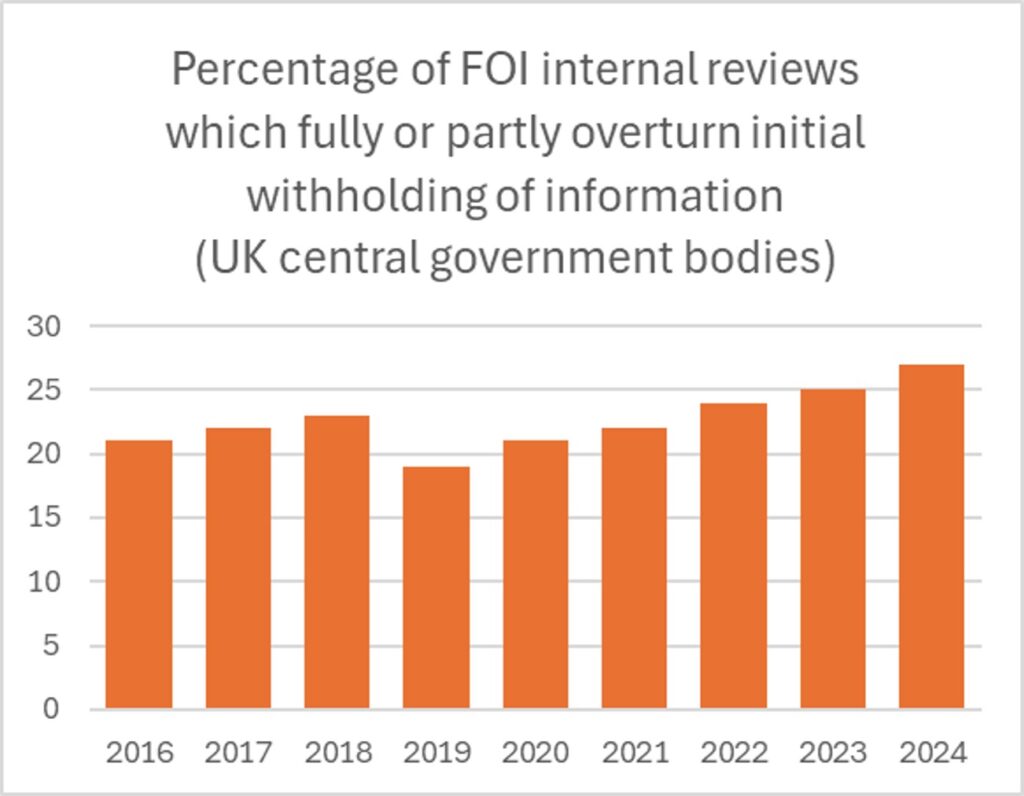
This is another statistical analysis I’ve done, of how often internal reviews change initial refusals. Again, as far as I’m aware, I’m the only person who is analysing the statistics issued about central government FOI requests to this extent. This chart shows how often internal reviews overturn, partly or entirely, an initial refusal from a government department that information should be withheld.
It’s only because we have statistics for central government that we can do this. We don’t know what the position is for all sorts of other public authorities. But what we can see here is that maybe 20 to 25 percent, and perhaps increasing, of internal reviews overturn an initial refusal, partly or entirely.
You can look at this in two ways. One is to say that internal reviews are actually doing their job, scrutinising the initial decision. But I also think that this rate is surprisingly high, suggesting that very often at the initial stage people are refusing FOI requests in ways that they should not be. This isn’t even the ICO getting involved. This is just somebody else in the same organisation saying you should have released it, and I think it points towards an initial level of obstruction in some cases.
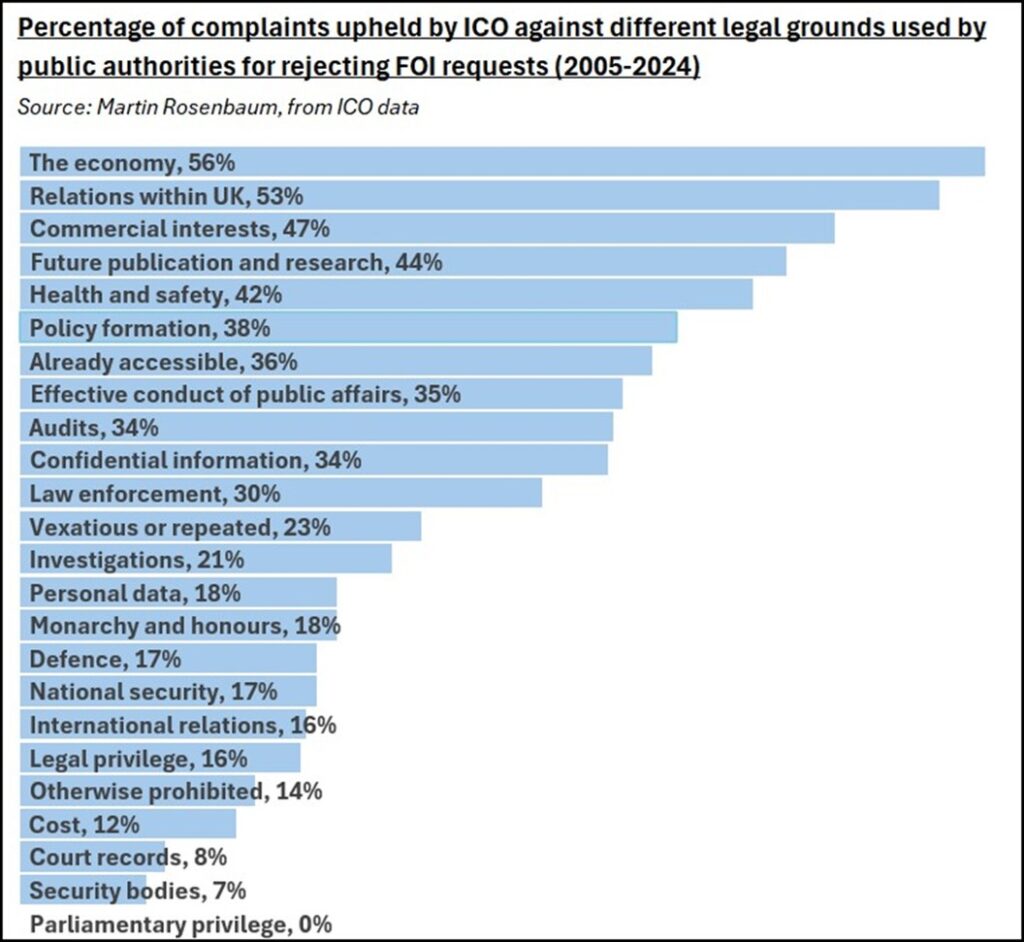
Now let’s look at how often the ICO overturns decisions made by public authorities. This is an analysis I did based on a dataset going back to 2005 which the ICO released last year. I don’t know to what extent this kind of analysis is done internally within the ICO or not.1
What I find really striking about this is how for some of these exemptions, the ICO overturns them so often. Taking the ones at the top, the economy and relations within the UK are not so often used, but commercial interests is a very frequent exemption used by public authorities to turn down requests. Yet of the cases that have been appealed to the ICO, basically in half of them the ICO has overturned it.
And there are other exemptions – future publication, policy formation and so on – where the ICO is very frequently overturning their use. What that really points to is a systemic issue that these exemptions are being overused by public authorities. And what the ICO in my view needs to do is draw attention to that and say there is a widespread problem of the overuse of certain exemptions.
I’m aware that the ICO has issues about resources and its level of casework. So if authorities could be stopped from overusing those exemptions, then that will be a way of reducing the level of casework that the ICO gets, and this is another reason why the ICO should be vocal in flagging the systematic overuse of certain exemptions.
The ICO
As I’m talking to the ICO, I should tell you my view of the ICO. This is what I wrote in my book: “Despite problems of resource constraints and significant delay (and the fact that I sometimes disagree with its decisions)” – we’ll come onto that later – “its existence is one of the strengths of the UK’s FOI system”.
When I’ve done training for journalists, this is one of the points that I make, that it’s a strength of the UK system to have an independent body which can overrule public authorities. That’s not the case in some other countries, and the ICO’s role is very valuable.
Let’s take some aspects of its FOI work in more detail. On delay, I very much welcome what the ICO has done over the past couple of years or so to speed up its consideration of complaints about FOI.
In contrast there was an extreme example back in 2009, when the ICO ruled in my favour on releasing the minutes of a Thatcher cabinet meeting about the Westland crisis, where it took the ICO four years to reach that decision. That’s ridiculous. It’s an extreme case, but when the ICO takes that sort of time, then public authorities have tremendous incentives to boot issues into the long grass, turning down requests for information on the basis that by the time the ICO rules, no one will care about it. A lot of progress has been made in speeding up the ICO’s procedures, and it’s vital that it doesn’t deteriorate again.
The fact that the ICO now prioritises certain FOI complaints with significant public interest is also a welcome and valuable step which enables the most important cases to be dealt with most quickly. Maybe the threshold for prioritisation is a bit too high and probably more cases should be prioritised, but in general it’s absolutely right to have done this.
I’m also very pleased by the way that the ICO is now taking serious regulatory action against recalcitrant public authorities. For example, the enforcement notices and practice recommendations served on numerous police forces recently and rightly, because the performance of the police in FOI terms has often been very bad, as has also been the case for various government departments, certain NHS bodies and so on.
It’s much more effective for the ICO to take this kind of regulatory action, issuing enforcement notices, than the kind of situation that we used to see beforehand.
Take this example that I wrote about the Cabinet Office. You would have this flow of decision notices from the ICO referring to Cabinet Office delays as being unacceptable, unhelpful, extreme, protracted, considerable, unsatisfactory, excessive, prolonged, severe. One decision notice after another would say this, but nothing ever changed by just issuing decision notices where it says in passing that delays are unacceptable.2
In contrast taking proper regulatory action and issuing enforcement notices is the best way to achieve change from the most recalcitrant public authorities, and I’m very glad to see that the ICO has been doing that.
However, I’m not going to say that everything about the ICO is completely marvellous. I’m pleased about reducing delays, I’m pleased about the prioritisation, I’m pleased about the enforcement action. But I do think there is an issue about the quality of certain ICO decisions, and there are decisions where the ICO does not really address properly the balance of the public interest.
This includes recent cases where I’ve been successful in appealing ICO decisions to the First-tier Tribunal.
One example involves the House of Lords Appointments Commission and the citations provided for some of Boris Johnson’s appointments to the Lords. In my opinion it’s overwhelmingly in the public interest that the public knows what are the official reasons given for why people are put in a legislative assembly. The tribunal agreed with me on that point3 that the citations should be public. So the House of Lords Appointments Commission was forced to reveal them.
I was disappointed, however, that I needed to appeal to the tribunal in order to achieve this. This is a case where the ICO should absolutely have said it’s in the public interest for this to be out in the open, and people could then assess for themselves the reasons that Boris Johnson gave as to why people should be members of the House of Lords with the right to decide on laws everyone else has to abide by.
That’s one example, and another occurred just last month when the First-tier Tribunal ruled that I should be given information in a Cabinet Office case where the ICO had ruled against me on a public interest test.
The tribunal said: “The tribunal shares the appellant’s view that there is a strong public interest in upholding standards of good decision-making, transparency and integrity in public administration … In the tribunal’s assessment, the withheld material is relatively benign and does not contain candid or controversial exchanges. The tribunal finds that the Cabinet Office’s concern over inhibiting future frank advice is overstated and not supported by the content of the material in question.”4
Here we have another example of the ICO in my view not taking a strong enough stance on where the balance of the public interest lies, and then the tribunal has to step in. That means extra work for me as the requester to appeal to the tribunal, but it’s also extra work for the ICO, which then ends up trying to defend an untenable position at the tribunal, costing a lot of time and money, as well as being against the public interest.
I know there are other cases where the ICO has taken a position which has annoyed the Cabinet Office. But I think it doesn’t do that often enough, and the ICO should be more prepared to stand up to the Cabinet Office on cases like these.
Finally, I wanted to make one other point, and this goes back to what I was saying earlier about the public debate about open government. I’d like to see the ICO now speaking out more about the broad advantages of transparency. We need to be hearing the voice of the ICO more often in public discussion.
To give one specific example, a government policy document issued last year states that it’s going to extend the FOI Act to private companies that hold public contracts, and that the government will take this forward “in due course”. So it’s publicly committed, but we’ve no idea when it will actually do this, or even if it will really happen. It’s not in the current legislation.
This is the kind of thing that in my view the ICO should be talking about now. It should be stepping into this discussion and saying this is an important and valuable change that is needed, because so many services are contracted out in the way that our public sector now operates.5
I’ve left time for questions. Thank you very much indeed.
——————————————————-
1 During the Q&A session afterwards I was told that the ICO does do this analysis itself.
2 On the day after I delivered this talk, the ICO announced it was issuing a practice recommendation against the Cabinet Office due to its FOI delays.
3 ICO staff are keen to point out that the tribunal did not agree with me on everything and upheld some other parts of their decision.
4 The material in question can now be found here, if you want to decide for yourself whether its release will damage free and frank discussion in the civil service in future.
5 In the Q&A I was reminded that the ICO has issued a report on this topic, but the point I made was that this was done back in 2019.
Twenty Years of FOI: A User’s Perspective (My presentation to the ICO) Read More »
What will be the political impact of the additional challenges that MRP polls may face at the next general election?
Last week’s local election results suggest that we are entering a new phase of multi-party politics across Britain.
Setting aside the local and national policy consequences, the impact will also be to make our elections harder to forecast and to complicate the task of the polling companies.
Yesterday I attended a meeting organised by the British Polling Council to discuss ways of tackling the industry’s failings at the last general election, when the polls significantly over-predicted how well Labour would do.
The next general election is likely to present further difficult challenges for the pollsters, particularly for MRP polls which proliferated in 2024. I think this could have important political ramifications.
The MRPs apply statistical modelling to survey data in order to produce individual constituency forecasts based on the local demography, and thus predict how many seats each party will win. Despite the headline on this piece, it stands for Multilevel Regression and Post-stratification, rather than Maybe Right, Perhaps.
Last year the MRPs made a positive contribution to understanding the pattern of public opinion by correctly showing that Labour and the LibDems would benefit from different swings in different seats, rather than the traditional norm of roughly uniform swing across the country. They were therefore a very useful expansion of polling techniques.
However the MRP polls all exaggerated the level of Labour success, as I have previously analysed. This systematic error across the industry stemmed largely from the voting intention polling figures which were fed into the statistical models.
If, as seems probable, the current electoral fragmentation continues until the next general election, then predicting constituency winners will surely get harder, for the following reasons.
All this will make forecasts more sensitive to problems with unrepresentative survey samples and any flawed assumptions or procedures in the statistical modelling. It is also likely to produce greater differences in constituency predictions between the various pollsters.
We already saw in 2024 how the MRPs can profoundly affect a campaign. Their forecasts for each seat were relied on by a number of tactical voting websites, and in local electioneering political parties made great use of those estimates which were convenient. The MRPs also probably had a substantial impact on the morale of some party activists, both positively and negatively.
All these points were made at the BPC event yesterday. For example, Martin Baxter from Electoral Calculus described how he received irate complaints about some local parties quoting out-of-date seat analyses in their election literature, but despite his efforts there was nothing practically he could do to stop them.
I expect next time there will be greater variation and inconsistency, with more opportunities for parties to cherry pick and publicise forecasts that suit them. We’ll also see more instances of different tactical voting organisations issuing contradictory advice. Sounds like a recipe for chaos and confusion. And perhaps more calls for polling to be banned during campaigns.
However I should note that one factor will help the MRP statistical modellers at the next election. As Prof Chris Hanretty pointed out yesterday, they won’t have to cope with the complication of new constituency boundaries.
As well as these challenges, the MRPs will also face the fundamental issue that the political polling industry in general does – the accuracy or otherwise of voting intention data.
The major problematic factors in 2024 considered by the BPC’s member companies, as I have reviewed in the past, were late swing, ‘shy Tories’, difficulties with reaching over 75s and the less politically engaged, and religion/ethnicity.
No one knows of course whether next time there will be much late changing of mind by the electorate. Some of the other concerns may be dealt with by more sophisticated demographic modelling and more ingenious or determined ways to survey the kind of voters who aren’t enthusiastic about being polled. But the problem of ‘shy Tories’ may get trickier to handle.
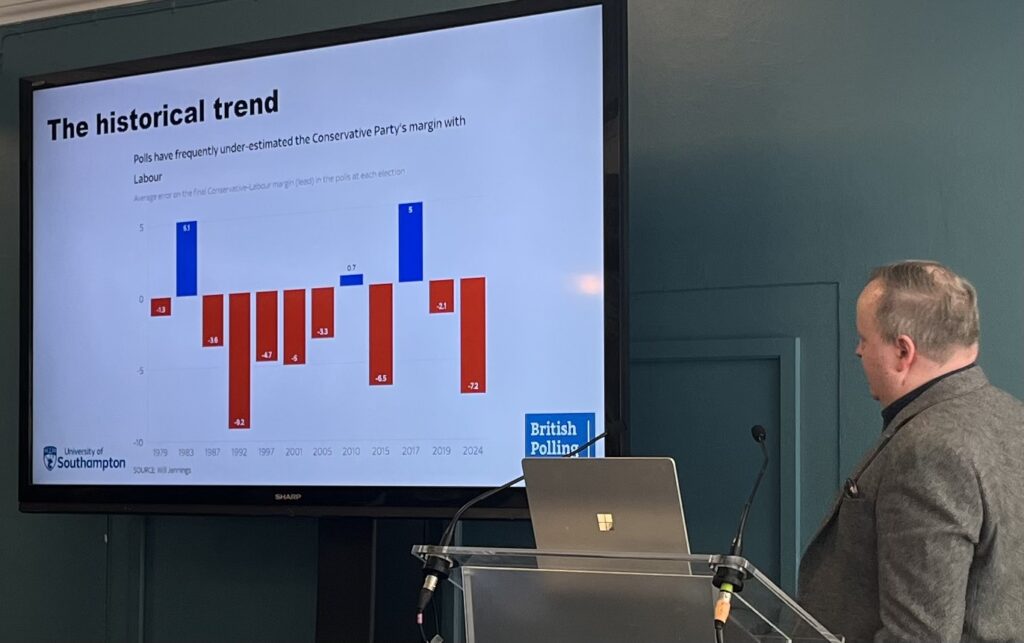
Pollsters historically and internationally have faced a frequent (but not universal) difficulty of under-stating backing for right wing parties (as can be seen in this chart presented by Prof Will Jennings). In the UK most pollsters try to manage this by weighting samples according to how people voted in the past.
Yet at a time of increasing volatility in the electorate, with chunks of public opinion churning around in all sorts of different directions, this is becoming much more awkward than in an era predominantly of neat two-party uniform swing.
This may also leave pollsters with dilemmas, as was illustrated at the meeting by Robert Struthers of BMG Research. Given how age was very strongly associated with voting patterns in 2024, it would surely make sense to take account of mortality and adjust for Tory voters (who tended to be much older) being more likely to die between then and the next election. But if you are already worried that your polling is under-stating Tory support, this would only take you further in the wrong direction.
Prof Patrick Sturgis also raised what could become a growing problem in the world of online survey research, which is that of questionnaires being completed by bots or organised bogus respondents, so that financial or other incentives can be claimed. This could be exacerbated if the fakers increasingly purport to be the hard-to-reach groups that pollsters may be upweighting in analysing samples.
It’s expected that the presentations (which I thought were impressively interesting and candid) given by the polling companies at yesterday’s meeting will be placed on the BPC website, to add to the analyses which are already there. Well done to the BPC, which aims to increase transparency in the UK’s political polling industry, for arranging the event.
The pollsters are continuing to grapple with all these issues. In particular they are awaiting the release of delayed data from the large-scale academic British Election Study, which may shed further light on what went wrong for the industry in 2024.
Maybe Right, Perhaps Read More »
I’ve been analysing recently published data from the Electoral Commission about local campaign spending by candidates at last year’s general election.
Newly released figures on campaign spending at the last election confirm the suggestion that Labour sharply limited its electioneering efforts in seats which the Liberal Democrats might win from the Tories.
My analysis of Electoral Commission data shows that in potential LibDem target seats, Labour spent on average about £4,600 less than it did in other comparable constituencies.
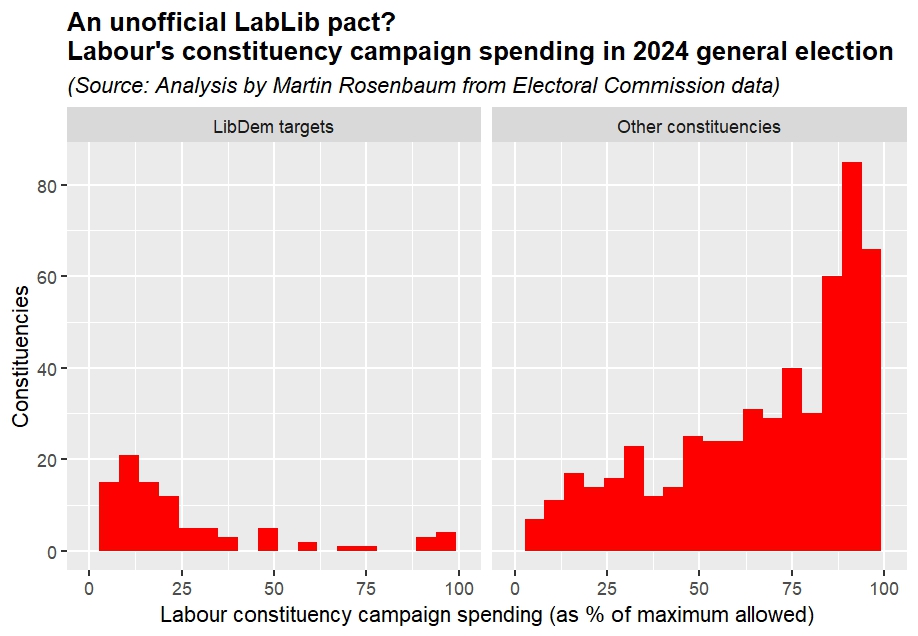
This chart demonstrates that in most places where the LibDems could be hopeful of victory, Labour generally spent a fairly small proportion of the maximum legally allowed for local campaigning at the 2024 election. This was in stark contrast to its general pattern of expenditure.
On average Labour candidates in these LibDem targets used only 26% of the legal limit, whereas Labour’s average in other seats was 68%.
While it could be argued that some of these seats were low Labour priorities as probably unwinnable, my statistical analysis shows that Labour put much less effort into campaigning in LibDem targets even after controlling for how well or badly Labour was positioned after the previous election in 2019.
Looking at seats then held by the Conservatives, and after taking account of the swing Labour would have needed to take the seat in 2024, Labour’s local campaign spending was £4,597 lower on average in these possible LibDem targets.
Party strategies
This fits with the claims made during the 2024 campaign that Labour was diverting its resources away from these seats, sometimes to the annoyance of disgruntled party activists.
In their local campaigning the LibDems concentrated resources very tightly indeed on their priority constituencies. Since these were predominantly ones held by the Conservatives who were clearly in massive electoral difficulties, they did not spend much money in other seats which were Labour or Conservative-Labour marginals.
These strategies suited both parties nationally who could each successfully focus their energies on maximising Tory losses and not competing against each other, without the need for any official agreement which would have been highly difficult and controversial.
I’ve defined LibDem targets here as constituencies where after 2019 they were the party in second place after the Conservatives (along with the much smaller number of places they held). This is a clear and reasonable demarcation.
However, it would not be identical to the list decided on by their party HQ, which added or dropped seats in line with fluctuating political circumstances and local factors. In any case this is more about which seats Labour would regard as sensible LibDem targets than the LibDems themselves. Nevertheless, even if there is a discrepancy of a few locations, that would not invalidate the very strong pattern this analysis identifies.
The local data published last month also reveals a very interesting contrast between Labour and Conservative spending patterns, which reflected the different political situations they faced when going in to the election.
This is indicated in the next two charts, which compare the party’s spending in each constituency in 2024 to its strength there after the previous general election in 2019.
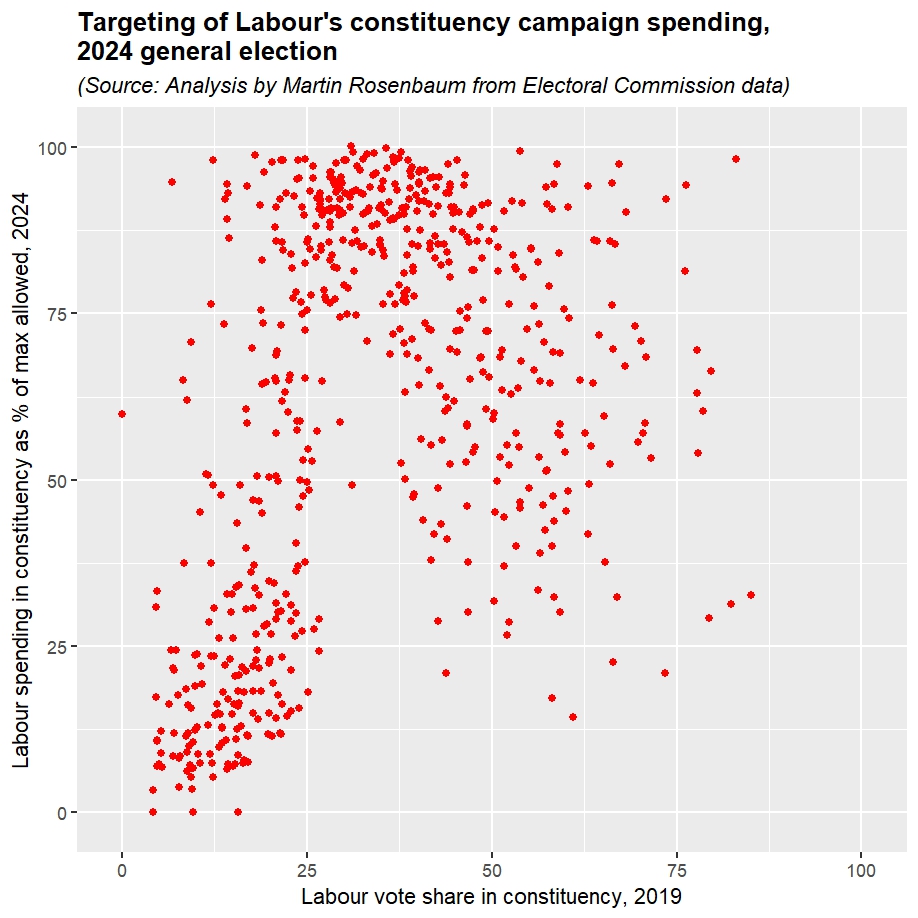
The ^ shape in the Labour graph shows the party tended to spend most in marginals, with significantly less expenditure in many hopeless seats and safe ones.
For the Conservatives, however, they had to concentrate resources on the seats they already held and were not able to assume any were safe. So their spending was much higher in places where they’d done better in 2019.
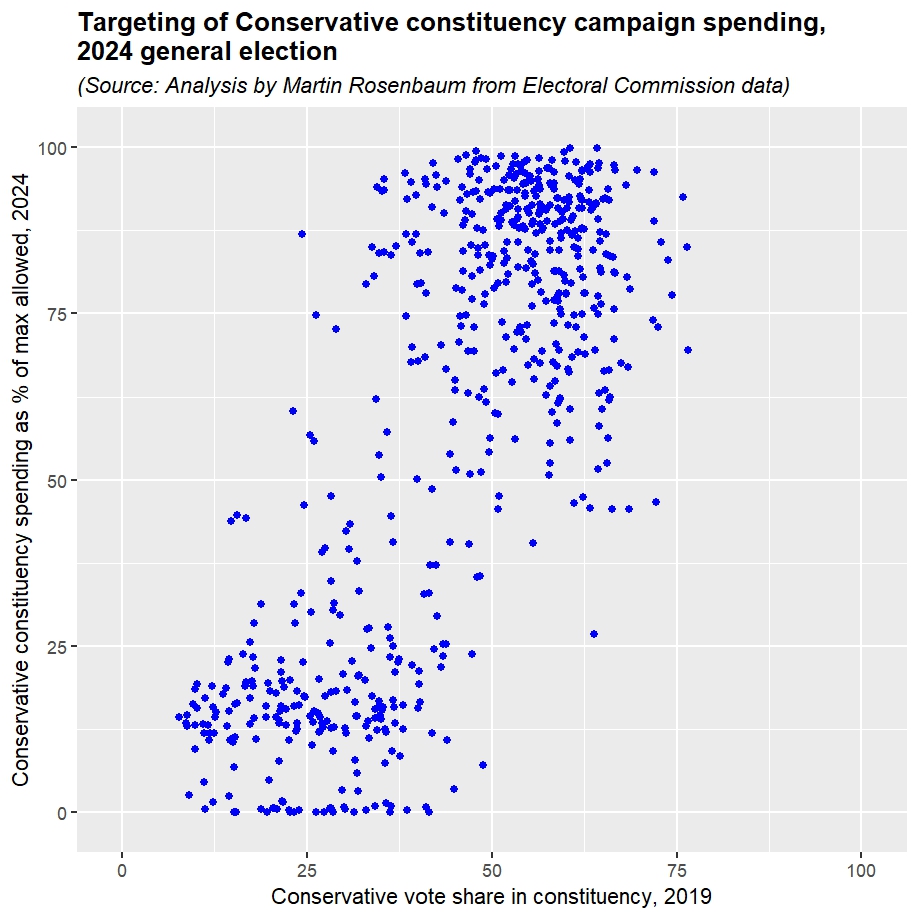
This expenditure refers to money parties use for electioneering in each constituency, including leaflets, posters, letters, meetings and office costs.
The legal limit in each place depends on the size of the electorate and whether the constituency is urban or rural. In 2024 the maximum allowed was generally in the range of £16,000 to £21,000.
Overall Labour spent £7.2 million on local electioneering, while the Conservatives spent a little less, £7 million. For the LibDems the total was £3.2 million, for Reform £1.3 million, and for the Greens £700,000.
This is separate to money used for national campaigning. The legal cap on that in 2024 was £34 million for parties standing candidates throughout Great Britain. The Electoral Commission has not yet released the details of the national sums spent by the major parties.
There is some evidence that spending on constituency campaigning does matter. I analysed how many extra votes each party got for an extra £100 of local spending, after controlling for the party’s vote share in that constituency in the 2019 election.
The figures are given in the table below. However it is difficult to read much into this, as parties would also be devoting more effort to places where they felt things were going well, especially the LibDems, Greens and Reform. So the overall direction of causation is far from clear.
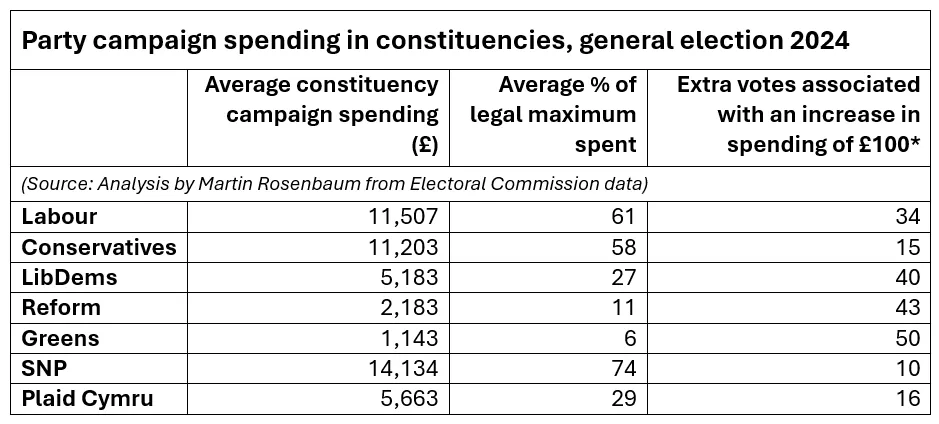
* This is the number of extra local votes in 2024 for that party associated with an increase of £100 in its local spending, after controlling for its votes in 2019 to take account of its position going into the election. (In the case of Reform, I used the figure for how the Brexit Party did in 2019, although they didn’t stand in many seats).
The art of the deal, LabLib style Read More »